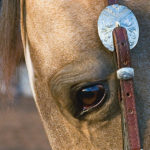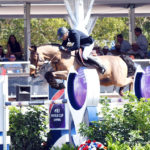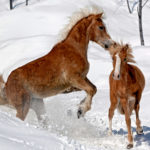30 July 2012 In the USA, we talk a lot about “home” advantage when championship time comes around. When the Boston Celtics come down to the seventh game in a series, they’re often hoping that the big-pressure game will be held “at home court” in Boston. Football teams have “home field” advantages, hockey teams have “home ice” and racehorses have “home tracks”. Does the same reasoning apply to horses? I remember Team USA’s David O’Connor traveling all the way to Australia in 2000 and coming home with a gold megal in eventing. But how probable is that? I turned to Daivd Marlin PhD, a leading researcher who has added a great deal to the body of knowledge of equine exercise phyiology as it applies to both event horses and horses’ ability to perform under adverse conditions like high heat and humidity. But can he factor in the effect of distance from home? Do the Brits truly have the home field advantage in the Olympics? Dr Marlin focused on eventing and cites a paper by Mary Nevill in the British Journal of Sports Medicine, published?in 2009. She looked at all the Summer Olympic Games since World War II, and found that home nations performed better than expected in the Olympic Games before and after as well as during the one they were awarded. They put this down primarily to financial investment in sport rather than a home advantage per se. In some sports, according to Dr. Marlin, home advantage is clear and significant. For example, in Britain’s Rugby Union, three different studies have estimated home advantage to be 61%, 67% (as opposed to 50% and no advantage) and 6.7 points. “There may also be a gender difference which is an interesting consideration in equestrian, which is of course the only Olympic discipline where men and women compete on equal terms,” Dr. Marlin continued. “For example, a study published last year (2011) by Koning looking at tennis found that there was a positive advantage for male players when playing at home but that there was no difference in performance of women players playing at home or away.” Dr. Marlin didn’t stop with looking at the past in his research. He built a statistical crystal ball to look at the London eventing. “Jane Williams, a lecturer at Hartpury College, and I have for several years been using epidemiological techniques to look at factors associated with elite performance in equestrian sports such as the English Derby and the Cheltenham Gold Cup,” Marlin said. “In this Olympic year, we have also chosen to look at what factors are associated with eventing success at the Olympic Games.” “Some of this data was presented at the Second Alltech Equine Performance Conference in April this year,” he shared. “The outcome is that our model predicts that those in the eventing medals in London are likely to be older male riders with the most 3* wins on the horse they are competing. “It will also be no surprise,” he said, “that our models indicate that the dressage phase usually exerts the most influence on medal success in both the individual and team competitions.” So if you’re handicapping the individual medals in eventing at London, Dr. Marlin has given you some factors to use. But he expressed some caution before you place your bets.< “One potential problem with these models is that they are based on what is most likely to happen. They don’t account for the ‘one off’ or ‘unusual’ circumstances. “If we believe the science, then our chance of success in eventing may be related to the number of older male riders on our team.” It’s true: no woman has ever won the individual gold medal in eventing. Only one male rider–William Fox-Pitt–is riding for Great Britain. That puts a lot of pressure on the statistical probability when only one rider can fulfill the prophecy of the numbers. But New Zealand has two older male riders–Andrew Nicholson and Mark Todd. The asterisks next to their names might be that they have lived and trained on British Soil for the past few years, with this week’s Olympic eventing as their target. Do they enjoy some home advantage, by proxy? “To some extent,” responded Dr. Marlin. “But the home advantage is more to d with home crowd and support…but given that there are almost as many Kiwis permanently in London as in New Zealand, maybe it does count. They will have the advantage of not having traveled.”< Dr. Marlin admits that he is looking forward to the benefit of hindsight: “I need to put a date in my diary to remind me to come back to this in September and analyze the equestrian results. Did we have evidence of home advantage? Were the medal winners on the whole older males? Only time will tell.”



is co-author of the textbook
Equine Exercise Physiology
.?An internationally-recognised expert in the field of equine and sport science, he has pblished over 200 scientific papers and conducted research within the sport of eventing to improve safety and welfare of horses during competition. He is a well-known speaker and is advisor to the British firm,
?
Dr Marlin’s crystal ball art courtesy of cali.org.





